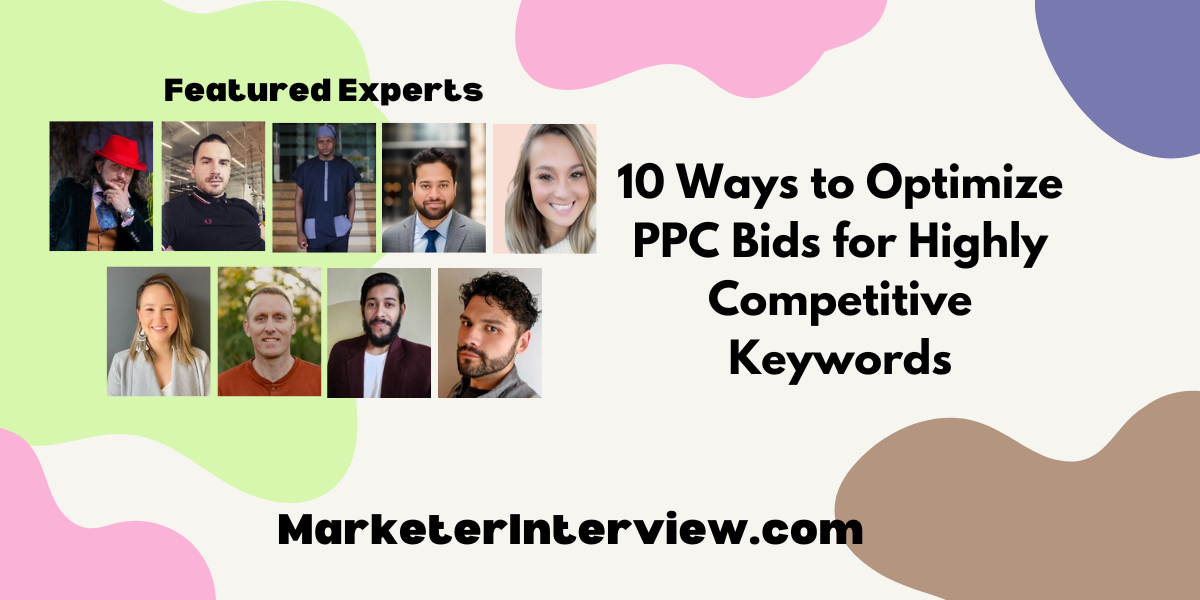10 Ways to Optimize PPC Bids for Highly Competitive Keywords
In the fast-paced world of digital marketing, mastering PPC bid strategies for competitive keywords is crucial. We’ve gathered insights from ten industry experts, including PPC Managers and SEO Consultants, offering specific tips from defining clear PPC campaign objectives to optimizing with audience-specific generic terms. Dive into this resource to sharpen your bidding tactics and stay ahead in the competitive keyword arena.
Want to get quoted in MarketerInterview.com content just like this? Apply to become a contributor today!
Contents
- 1 Define Clear PPC Campaign Objectives
- 2 Utilize Dayparting for Bid Timing
- 3 Start with the “Maximize Clicks” Strategy
- 4 Combine Dayparting and Geo-Targeting
- 5 Bid on Display Network Only
- 6 Use Precise Match Types and Negative Keywords
- 7 Leverage Google’s Keyword Planner Tool
- 8 Implement Target CPA with Portfolio Bid Caps
- 9 Focus on Quality Score Optimizations
- 10 Optimize with Audience-Specific Generic Terms
Define Clear PPC Campaign Objectives
Enhancing PPC bidding tactics for high-traffic keywords can truly transform your results, though it might seem daunting. These keywords attract a massive number of searches and are highly coveted. This translates to fierce competition and rapidly escalating costs. So, how can you achieve optimal outcomes without overspending? The key lies in mastering PPC bidding and employing some clever strategies.
Begin by defining clear objectives for your campaign. Whether your goal is to enhance brand visibility, drive traffic, or increase conversions, having a well-defined aim will shape your strategy. Additionally, gaining an in-depth understanding of your target audience is crucial. Conduct thorough market research to uncover their demographics, interests, and behaviors. This insight will enable you to create more targeted ads and fine-tune your bidding strategy to better resonate with your audience. Organizing and grouping your keywords is another savvy tactic. By categorizing keywords based on relevance and search intent, you can develop more focused ad groups and customize your bidding strategies for each group.
Adjusting bids based on factors such as device type, time of day, location, and audience demographics can significantly enhance your PPC performance. For instance, if mobile users are more likely to convert, increasing bids for mobile traffic can be beneficial. It’s also essential to closely monitor your campaign’s performance. Regularly evaluate metrics like click-through rates, conversion rates, and cost per acquisition to identify what’s effective and what isn’t. Use this data to make informed bid adjustments.

Nikolay Krastev, Head of SEO, Nikolay Krastev
Utilize Dayparting for Bid Timing
Sure thing! One secret-sauce tip for optimizing PPC bids in a fiercely competitive keyword arena is to embrace the power of dayparting. Imagine this: you’re bidding on keywords like “luxury watches” that are hotter than a black leather seat in July.
Instead of throwing your entire budget at the wall and hoping something sticks, analyze when your audience is most active and engaged. Maybe they’re night owls who love shopping for watches after dinner, or early birds catching deals with their morning coffee.
Adjust your bids to be more aggressive during these peak times and scale back when your audience is less active. This way, you’re not just another fish in the sea; you’re the shark that knows exactly when to strike. It’s like having a secret handshake with your target audience, and it can make all the difference in a crowded market.

Lukasz Zelezny, SEO Consultant, SEO ANT LTD
Start with the “Maximize Clicks” Strategy
For any competitive keywords, consider starting with the Maximize Clicks bidding strategy without going too aggressive and keeping a close watch. Once the keywords gather data on clicks, impressions, CTR, conversions, and quality score, you can consider switching to Target CPA (TCPA).
This allows you to set your desired cost per acquisition, and Google Ads will optimize bids to achieve that target within your budget. Don’t forget to focus on optimizing your ad relevance, landing-page experience, and keyword relevance for better performance and potentially lowering your bids further.

Nayan Prakash, PPC Manager
Combine Dayparting and Geo-Targeting
One effective technique for optimizing PPC bids for highly competitive keywords is combining dayparting and geo-targeting. By analyzing your performance data, you can identify specific times of day and geographic locations where your ads perform best.
Adjusting your bids to be higher during peak performance periods and in high-conversion areas ensures that your budget is utilized efficiently, maximizing your visibility when and where it’s most impactful. This targeted approach not only enhances your ad relevance but also helps reduce wasted spending, thereby improving your overall return on investment.

Lawrence Young, Marketing Manager, Growthlabs
Bid on Display Network Only
A little-known secret with Google Ads is to create a campaign where you only bid on your most competitive keywords, but you set up the campaign so that your ads only show on the Display Network. It won’t be as high-converting as the Search Network, but your cost per click will be astronomically lower because most of your competitors exclude the Display Network.

Adam White, SaaS Growth Consultant, Landing Page Whisperer
Use Precise Match Types and Negative Keywords
Combining tightly dialed-in keyword match types with a large negative keyword list has worked for us. When you’re bidding on high-stakes keywords, you want to make sure your ads are showing up for exactly the terms you’re targeting and not wasted on irrelevant searches.
This means using precise match types—like phrase and exact match—to keep your keyword targeting laser-focused. It cuts down on the noise and ensures you’re bidding only on terms that matter to you.
At the same time, building an extensive negative keyword list will help you filter out any searches that don’t align with your products or services. For example, if you sell premium office chairs, you don’t want to show up for searches like “cheap office chairs” or “office chair repair.” Refining your list means you’ll avoid spending money on clicks that won’t convert.
Once you have your match types and negative keywords sorted, Google’s AI-powered automated bid strategies can help you maximize conversions and get the most bang for your buck.

Esther Buttery, Director, CLIQ Marketing Content
Leverage Google’s Keyword Planner Tool
On the Google Ads platform, ensure you are utilizing the Keyword Planner Tool for your keyword research. It offers various insights and information regarding keywords and their performance in Google Ads campaigns, such as average monthly searches, competition level, and bid prices. Additionally, the tool provides keyword suggestions and assists in planning for the future by showcasing keyword trends.
It is an incredibly powerful research tool, and it’s completely free within your Google Ads account. Utilizing the Keyword Planner should be your first step when researching keywords for your next campaign.
Ben Caplan, SEO and SEM Manager
Implement Target CPA with Portfolio Bid Caps
In our experience managing competitive keywords for insurance clients at Stratosphere, we’ve found success with a multi-layered approach using Target CPA bidding and portfolio bid caps.
For a client in the highly competitive “car insurance” space, we utilized broad-match keywords alongside Target CPA bidding to capture a wider range of relevant searches while controlling costs.
To prevent overspending on specific terms within the broad-match pool, we implemented portfolio bid caps for this campaign. This allowed us to set a maximum cost-per-acquisition limit specifically for “car insurance” keywords, ensuring aggressive bids from Google Ads wouldn’t exceed our budget for these high-volume terms.
The result? We achieved a 15% increase in qualified leads while staying within the target CPA, demonstrating the effectiveness of combining broad matches with controlled bidding strategies for competitive keywords.

Vishal Kumar, Digital Marketing Manager, Stratosphere
Focus on Quality Score Optimizations
For really competitive keywords, I typically focus on quality-score optimizations. Many people think bidding higher will win you top spots, but it’s really not the most sustainable or cost-effective solution. A higher QS means that your ads are more relevant and useful to people who are actively searching.
Google does a good job awarding campaigns with good QS. You will see lower CPCs, better ad positioning, and more visibility—aka more eyeballs—on your content.
A couple of ways to improve QS are:
1) Ad relevance – make sure keywords are closely related to copy and landing page content.
2) Landing page optimizations and user experiences – optimized, mobile-friendly, aligned with ads content.
3) Expected CTRs – focus on compelling content that drives good engagement and CTRs.

Alexis Garrison, Director of Digital Strategy, Conveyor Marketing Group
Optimize with Audience-Specific Generic Terms
In my experience, I have learned that one effective trick to optimizing PPC bids for highly competitive keywords is to keep things simple with generic words and terms that are peculiar to your target audience.
The truth is, when conducting a search, members of your audience will search using words and phrases that are familiar to them. This is why it would be beneficial to conduct research on your audience ahead of time.
The truth is, it is only possible to optimize for an audience you know well enough to understand not just their needs, preferences, and pain points, but the exact keywords they are most likely to enter into a Google search when conducting a specific search.
Keeping things simple is how I have been able to achieve competitive keyword optimization that targets audiences more than just the audience within my geographical location, but for multiple locations and regions.

Gideon Omeruta, SEO and Content Lead, Findbyplate
Want to get quoted in MarketerInterview.com content just like this? Apply to become a contributor today!






